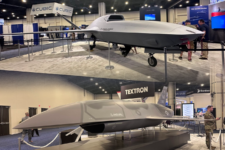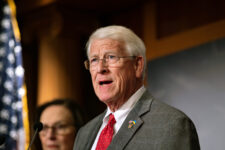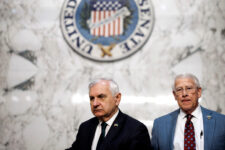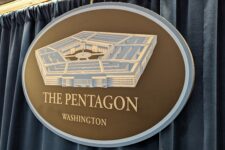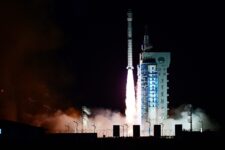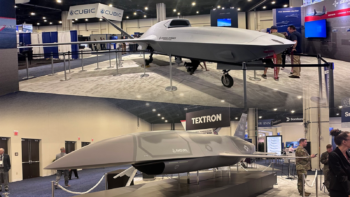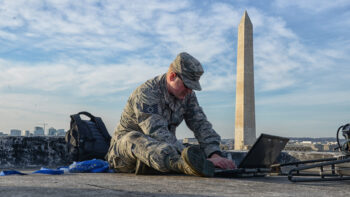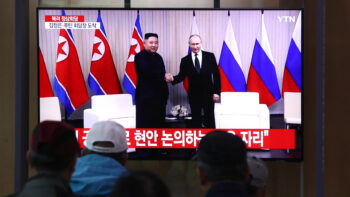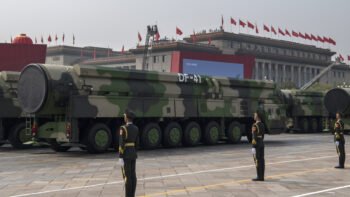
[Updated 2:00 pm with Boeing comment] The chairman of the House subcommittee on strategic nuclear forces slammed the Obama Administration today for what he called its lackadaisical approach to missile defense in the face of rising threats from North Korea, Iran, and – implicitly – China.
“We all know that the world is getting less safe,” Rep. Mike Turner (R-Ohio) told reporters at a breakfast talk in Washington, D.C. “Look at North Korea, look at Iran,” he said. “These are real and emerging threats that we need to stay ahead of,” he said, “[but] if you listen to the hearings in our committee, there is a lack of urgency [from] the Administration in what is developing in North Korea and Iran…. They will use words like ‘slow to emerge’ or ‘we have time.'”
Turner, chairman of the Strategic Forces panel of the House Armed Services Committee, has consistently criticized Administration plans to cut investment in both missile defense and America’s own offensive arsenal of nuclear weapons. Asked point-blank by one reporter why the U.S. needs the traditional and expensive “triad” developed for deterrence in the Cold War – land-based missiles, ballistic missile submarines, and nuclear-capable bombers – against rogue states with a fraction of the Soviet Union’s nuclear capability, Turner warned, “North Korea and Iran will not be our only potential threat or risk, even as they emerge to attain capability to threaten the United States… We still have to look at all aspects of those who have nuclear weapons who might be in conflict with the United States.”
From the standpoint of geopolitical plausibility, Turner isn’t talking here about friendly nuclear powers like Great Britain, Israel, India, or (even) France, nor about Pakistan, ambivalent and unstable a partner as it is. He’s talking about once-and-perhaps-future rivals Russia and, especially, China. And while Turner strongly advocates missile defense against rogue states like North Korea and Iran – which are still developing what will be, at most, a limited capacity to strike the continental United States – he notes that “this Administration would say, with respect to Russia and China, that missile defense is not even directed [against them]”: Traditional deterrence will have to do because the Reagan-era dream of a missile defense system able to stop a superpower salvo of ICBMs is still far out of reach.
Indeed, just getting the current, small-scale systems to work may be a challenge. At another event this morning on the ground-based “mid-course” missile defense system, Boeing VP for missile defense Greg Hysop announced the company had figured out fixes to the latest failed test and were working to implement them — not exactly lightning speed since that failed test occurred in December 2010, with the last success in 2009.
Rep. Turner fended off persistent questioning about technical problems with the system, based in Alaska and California, which is currently the only program in place to defend the homeland against intercontinental strikes. “Anyone who supports missile defense – who supports missile defense of mainland United States – has to be a supporter of the ground-based system because it’s the only we have,” said Rep. Turner. But the Administration has cut back spending on the system until its testing schedule is “a slow waltz” of just one actual flight test a year. “Whenever an issue is discovered…cutting funding to that system is not going to help you solve that problem,” he said. “We should have had I believe a much more aggressive testing process, much greater evaluation” – and that, of course, costs money.
So far, “we’re not seeing a commitment by this Administration for protection of the homeland,” Turner said. “The administration’s financial support and focus is so on the regional type systems [like] the European ‘phased adaptive approach,'” – the current centerpiece of the Administration’s efforts – “they are neglecting what should be our primary focus, which is protecting the homeland from missiles.”
Otto Kreisher also contributed to this story.
From Boeing’s struggles to inflation relief funds: 5 industry stories from 2024
Making a year-end list in which she forces references to Taylor Swift songs for no reason has basically become reporter Valerie Insinna’s favorite Christmas tradition.
